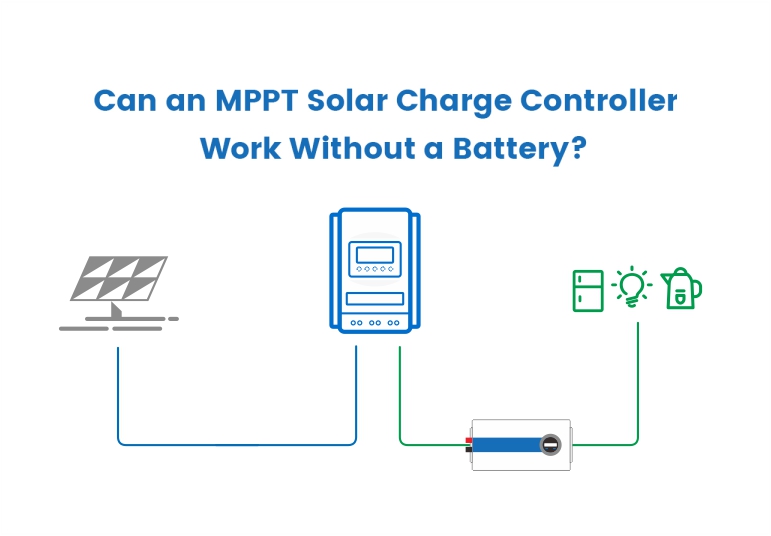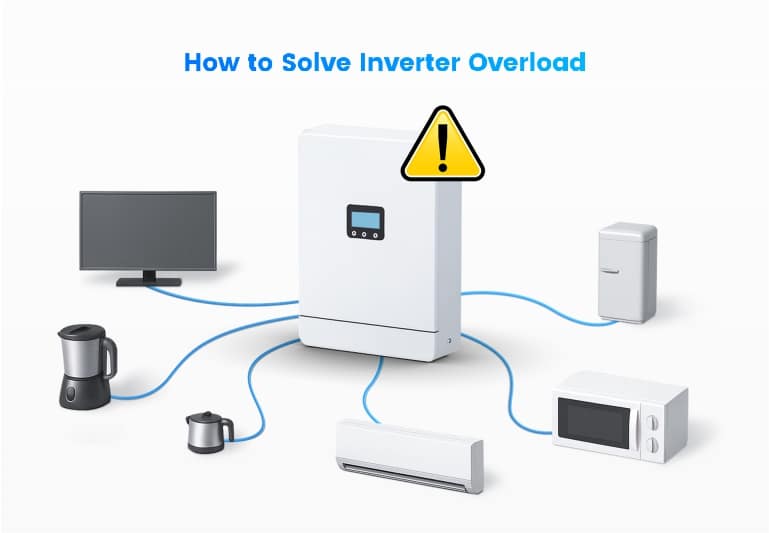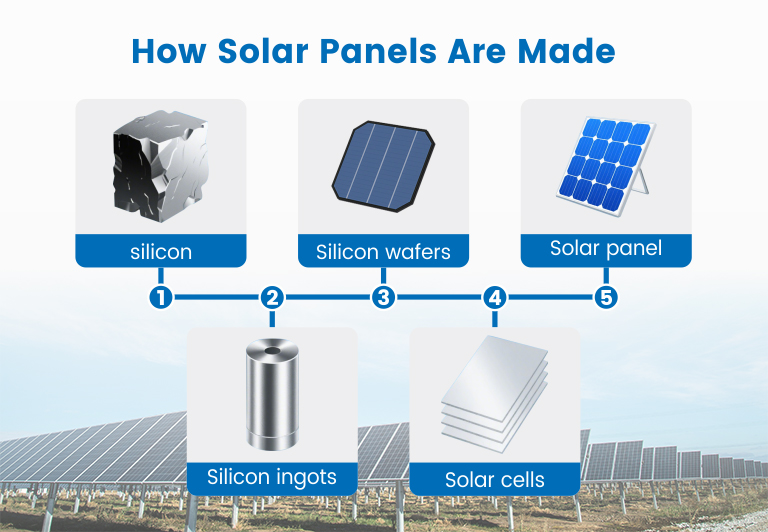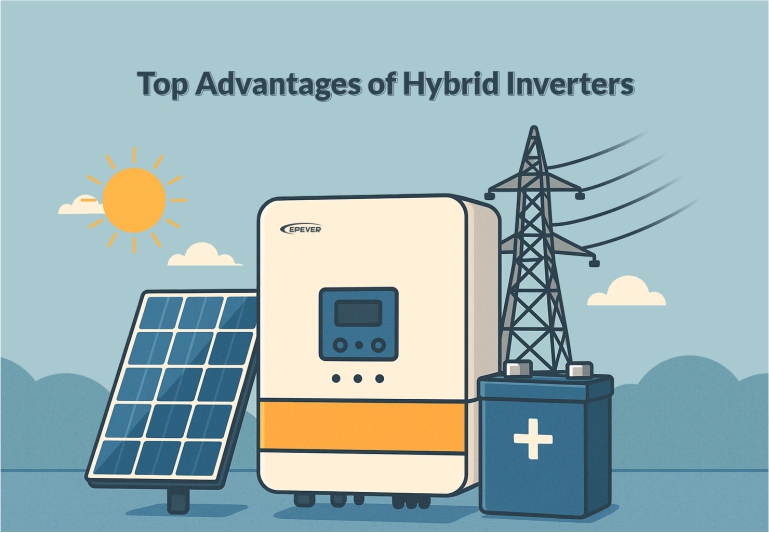Can an MPPT Solar Charge Controller Work Without a Battery?
- 14 July 2025
- 217 views
- No Comments
Can an MPPT Solar Charge Controller Work Without a Battery?
Yes, But It's Not Recommended
Some MPPT solar charge controllers can technically operate without a battery. However, it is not recommended due to various functional and reliability limitations. While the controller won’t be damaged in most cases, running it without a battery often results in unstable performance, inefficient energy use, and the risk of damaging connected loads. Let’s explore why.
What Does an MPPT Charge Controller Do?
An MPPT charge controller is designed to optimize the power harvested from solar panels by adjusting the electrical operating point to deliver the maximum available power. It plays a key role in converting solar energy into usable DC electricity and safely charging the battery by regulating voltage and current. Unlike basic PWM (Pulse Width Modulation) controllers, MPPT controllers are especially efficient when the solar panel voltage is higher than the battery voltage.

How Does an MPPT Controller Work Without a Battery?
In a typical setup, the MPPT controller sits between the solar panels and the battery. Without a battery, the controller may still power loads directly, but its core charging logic is bypassed. Instead of optimizing for battery storage, it now must handle real-time energy delivery to the load.
Some MPPT controllers can regulate DC output to match a connected load, but this use is marginal and outside of what most manufacturers officially support. Power delivery becomes inconsistent and entirely reliant on sunlight availability. The controller will still operate, but its ability to regulate output voltage effectively is significantly reduced.
Risks and Limitations of Battery-Less Operation

- Voltage Instability:Solar power fluctuates with sunlight; the output voltage may spike or drop.
- Load Incompatibility:Many loads can’t tolerate fluctuating voltage and may shut down or fail.
- Inefficient Usage:Excess energy not used by the load is wasted, as there is no storage.
- Reduced MPPT Efficiency: MPPT logic is built for battery optimization and becomes underutilized.
Why Is the Battery So Important in Solar Systems?
The battery is the energy reservoir of a solar system. It allows for energy storage during sunlight hours and ensures stable, continuous power during the night or cloudy conditions. Without it, you’re limited to using energy only when the sun is shining, with no buffer against fluctuations. Batteries also protect your devices by stabilizing voltage output, managing load demands, and providing backup power when solar input is insufficient.

When Does Battery-Less Use Make Sense?
- Daytime-only loads like water pumps, fans, or irrigation systems.
- Cost-sensitive or temporary projects, such as experimental or educational setups.
- Portable or lightweight systems where space and weight constraints prohibit battery storage.
In all of these, success depends on your system’s ability to handle fluctuating solar input and your load’s tolerance to voltage variation.
Exception: Constant Voltage Output Makes a Difference

Most solar controllers aren’t equipped to handle battery-free operation reliably. However, some advanced MPPT controllers include a constant voltage output function, enabling more stable direct-to-load use even when the battery is disconnected or missing.
For example, EPEVER’s XTRA G3, IT-NC, and ET-NC series controllers support this functionality with the following benefits:
- Stable Direct Load Supply: Maintains regulated voltage to loads even when the battery is disconnected.
- Voltage Overshoot Protection: Prevents high-voltage spikes, especially during BMS cut-off events.
- Lithium Battery Compatibility: Supports smooth operation with various lithium battery chemistries.
- Load and Inverter Safety: Protects critical components by providing clean, consistent voltage.

This function is particularly helpful in real-world scenarios such as:
- BMS Failure or Disconnection: If a battery’s BMS cuts off due to overvoltage, the G3 continues supplying regulated voltage to the load.
- Component Mismatch: Protects against mismatches in system voltage from panels, controllers, and inverters.
- Aging or Damaged Components: Adds resilience against erratic voltage behaviors.
- High Temperature Output Spikes: Mitigates abnormal solar panel behavior in extreme heat.

This capability allows battery-free systems to run more safely and reliably than with conventional MPPT controllers. Watch our XTRA-G3 series Introduction or check out our XTRA-G3 Webinar Deep Dive to learn more about constant voltage output and real-world setup tips.
Over-Current Protection Matters Even More Without a Battery
In systems operating without a battery, real-time fluctuations in solar input can cause brief current spikes. Advanced controllers like the EPEVER XTRA G3 feature intelligent over-current protection, which detects and responds immediately to abnormal load current. By dynamically managing the output and disconnecting the load during critical conditions, the controller safeguards system components from damage — especially valuable when no battery is present to buffer current flow.
Final Recommendations: Should You Do It?
In conclusion, while it is technically possible to operate an MPPT solar charge controller without a battery, it is usually not practical or efficient. If you don’t choose the right controller, especially for battery-free setups, you may lose voltage stability and proper load protection. Most importantly, the system can become unreliable or cannot support continuous or sensitive loads.
If you’re exploring battery-free options, it’s essential to understand your system’s limitations and select components—such as advanced MPPT controllers with constant voltage output—that can better support this setup. For most users, however, incorporating a battery remains the most reliable and flexible approach to building a solar energy system.




